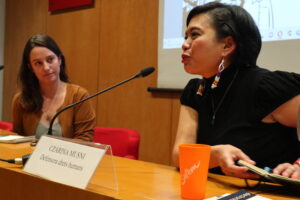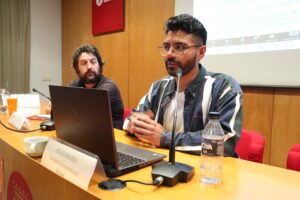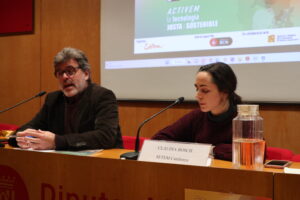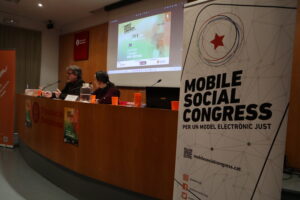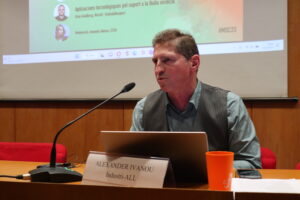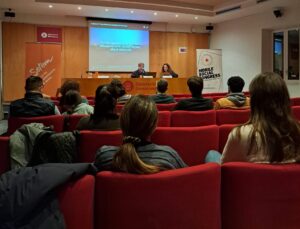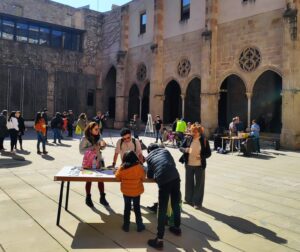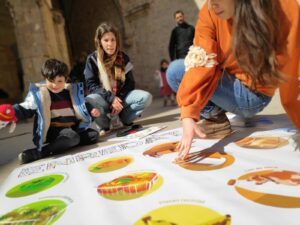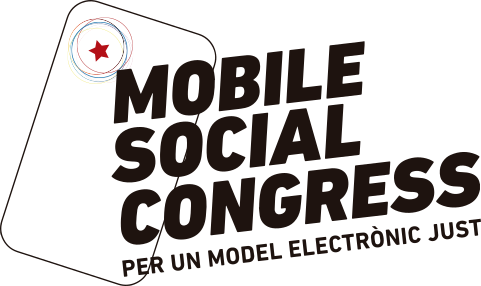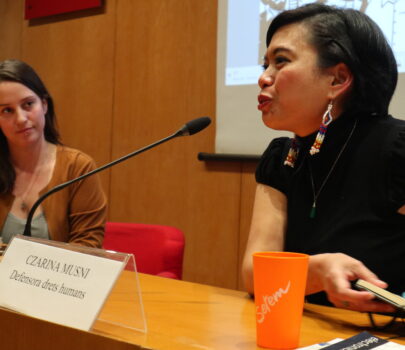The Mobile Social Congress is consolidating itself as an essential space to make visible the violations of human and environmental rights in the technological industry.
The Mobile Social Congress (MSC), which was held the same week as the Mobile World Congress, is consolidating itself as an essential space to publicize the impacts of the technological industry and make visible violations of human and environmental rights that, if not, they would be silenced.
Activist action and conferences with international experts
The starting shot of the MSC was an ARTivism action – outside the program – which took place on Monday 27 February at the gates of Fira de Barcelona (l’Hospitalet de Llobregat) coinciding with the start of Mobile World congress. In a joint performance by SETEM Catalunya and Scientist Rebellion activist, the harsh working conditions in the mines linked to the technological sector were staged, where workers’ rights are not respected while having a strong impact on the environment. After the action, a manifesto was read. “Many of these miners, in Africa, Asia and South America, work in inhumane conditions to satisfy the insatiable hunger for new electronic devices”, read one of the activists.
The MSC’s official program began on March 2 at Pati Manning. International experts made known the violations of human and environmental rights in the technological industry, especially in the countries of the Global South. At the inaugural conference, David Llistar, director of Global Justice and International Cooperation at Barcelona City Council, stated that the electronics sector “is at the top of the capitalist pyramid, it is the vanguard of global chains of unfair supply”.
The conference had three panels. In the first two, international experts spoke about the impacts of the technology industry in the Philippines or the persecution of trade unionists in Thailand or Malaysia, but also about the progress that has been made in some of these countries thanks to the organization of workers and activists.
In the latter, the environmental and social impacts of mining were seen. In this context, Diego Marín, from the European Environmental Bureau (EEB), emphasized that we are mortgaging future generations with the extraction of minerals for the technological industry. The case of Bolivia was also discussed, where mining cooperatives have been organized to promote fairer and more sustainable production for both people and the environment.
Meeting of organisations from Spain to address existing legislation
In the framework of the MSC, last Friday we organized the first meeting between Spanish organisations, among which are included SETEM Catalunya, e-reuse, CECU, Solidança, Restarters, Dónalo, Amigos de la Tierra and Esplai Foundation. These analysed the existing laws on repair of electronic devices and eco-design of products; as well as they transferred the organizational and governance model of the European Right to Repair network, which is dedicated to advocacy on a European scale to guarantee the right to repair.
Another key point was the interest shown by the entities in creating a platform for the right to repair electronic devices, as well as combating planned obsolescence at a state level. The main reasons for starting it would be: questioning the waste of resources in the current consumption model; offer an alternative to consumers given the environmental conflicts generated by the extraction of resources for the production of electronics; as well as promoting a culture of repair to regain technological sovereignty.
“The organizations call on other organizations that share these motivations, to join the process of creating this state platform”, stated the organizations that participated in the meeting.
Waste from the technological industry
The MSC is a space for reflection, debate and reporting on the impacts of the technology industry, which are promoted at the Mobile World Congress such as, for example, the generation of waste linked to electronic devices. With this aim, a film forum was held on Friday at Pati Manning in Barcelona, in which the documentary “E-life” by Edward Scott-Clarke, which deals with the electronic waste sent from the Kingdom, was shown United in Ghana. Afterwards, there was a debate and commentary on the film by Robin Ingenthron, CEO of the Good Point Recycling organization in Middlebury (United States) and with more than 30 years of experience in the second-hand repair and sales sector hand.
Integenhron offered a critical look at the documentary because, in his view, it does not show that there is a large network of professional repairmen in Ghana, nor that most electronic devices arriving in that country from Europe have been repaired and are sold as second-hand products. According to this specialist, the repair and sale of second-hand electronic items is essential to deal with the current context of climate crisis and scarcity of both mineral resources and rare earths. However, he warned that brands like Apple put obstacles in the way of small repair companies, which they consider to be exporters of electronic waste.
Workshops and games for everyone
Beyond being a space for reflection, the MSC also wants to be a place to empower citizens and give them tools to activate this fairer and more sustainable technology. For this reason, Saturday ended with practical activities for all ages at the Convent of Sant Agustí in Barcelona. In this sense, the participants of the Install Party workshop, on free software, gained the knowledge to acquire sovereignty over their data; while at the Restart Party, they learned to repair small electronic devices. Children were able to acquire basic concepts about responsible consumption with games. The event also hosted the exhibition “El cicle de vida de l’electrònica”, from SETEM Catalunya’s catalogue of services.
